 W
WAlan Mathison Turing was an English mathematician, computer scientist, logician, cryptanalyst, philosopher, and theoretical biologist. Turing was highly influential in the development of theoretical computer science, providing a formalisation of the concepts of algorithm and computation with the Turing machine, which can be considered a model of a general-purpose computer. Turing is widely considered to be the father of theoretical computer science and artificial intelligence.
 W
WAlan Turing (1912–1954), a pioneer computer scientist, mathematician, and philosopher, is the eponym of all of the things listed below.
 W
WThe Alan Turing Building, named after the mathematician and founder of computer science Alan Turing, is a building at the University of Manchester, in Manchester, England. It houses the School of Mathematics, the Photon Science Institute and the Jodrell Bank Centre for Astrophysics. The building is located in the Chorlton-on-Medlock district of Manchester, on Upper Brook Street, and is adjacent to University Place and the Henry Royce Institute. While under construction the project was known as AMPPS : Astronomy, Mathematics, Physics and Photon Science. The building was shortlisted for the Greater Manchester Building of the Year 2008 prize, which is awarded by the Greater Manchester Chamber of Commerce. The manager of the building project was awarded a silver medal in the Chartered Institute of Building "Construction Manager of the Year" awards.
 W
WThe Alan Turing Centenary Conference was an academic conference celebrating the life and research of Alan Turing by bringing together distinguished scientists to understand and analyse the history and development of Computer Science and Artificial intelligence.
 W
WThe Alan Turing Institute is the United Kingdom's national institute for data science and artificial intelligence, founded in 2015. It is named after Alan Turing, the British mathematician and computing pioneer.
 W
WThe "Alan Turing law" is an informal term for the law in the United Kingdom, contained in the Policing and Crime Act 2017, which serves as an amnesty law to pardon men who were cautioned or convicted under historical legislation that outlawed homosexual acts. The provision is named after Alan Turing, the World War II codebreaker and computing pioneer, who was convicted of gross indecency in 1952. Turing received a royal pardon (posthumously) in 2013. The law applies in England and Wales.
 W
WThe Annotated Turing: A Guided Tour Through Alan Turing’s Historic Paper on Computability and the Turing Machine is a book by Charles Petzold, published in 2008 by John Wiley & Sons, Inc.
 W
WThe Automatic Computing Engine (ACE) was a British early electronic serial stored-program computer designed by Alan Turing. It was based on the earlier Pilot ACE. It led to the MOSAIC computer, the Bendix G-15, and other computers.
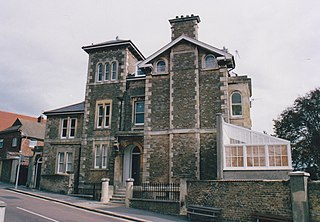 W
WBaston Lodge is a residential villa in St Leonards-on-Sea, Hastings, East Sussex, southern England.
 W
WThe bombe is an electro-mechanical device used by the British cryptologists to help decipher German Enigma-machine-encrypted secret messages during World War II. The US Navy and US Army later produced their own machines to the same functional specification, albeit engineered differently both from each other and from Polish and British bombes.
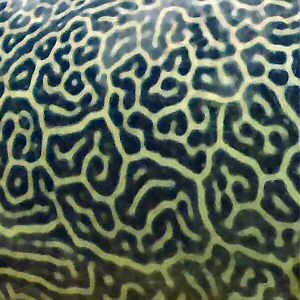 W
W"The Chemical Basis of Morphogenesis" is an article that the English mathematician Alan Turing wrote in 1952. It describes how patterns in nature, such as stripes and spirals, can arise naturally from a homogeneous, uniform state. The theory, which can be called a reaction–diffusion theory of morphogenesis, has become a basic model in theoretical biology. Such patterns have come to be known as Turing patterns. For example, it has been postulated that the protein VEGFC can form Turing patterns to govern the formation of lymphatic vessels in the zebrafish embryo.
 W
WThe Colonnade Hotel is a 4-star London hotel with 43 rooms, of which three are suites. The hotel is located opposite Warwick Avenue Underground station and Little Venice.
 W
WIrving John Good was a British mathematician who worked as a cryptologist at Bletchley Park with Alan Turing. After the Second World War, Good continued to work with Turing on the design of computers and Bayesian statistics at the University of Manchester. Good moved to the United States where he was professor at Virginia Tech.
 W
WAlan Turing was an English mathematician, computer scientist, logician, cryptanalyst, philosopher, and theoretical biologist. He left an extensive legacy in mathematics, science, society and popular culture.
 W
WAlan Mathison Turing was an English mathematician, computer scientist, logician, cryptanalyst, philosopher, and theoretical biologist. Turing was highly influential in the development of theoretical computer science, providing a formalisation of the concepts of algorithm and computation with the Turing machine, which can be considered a model of a general-purpose computer. Turing is widely considered to be the father of theoretical computer science and artificial intelligence.
 W
WThe National Physical Laboratory (NPL) is the national measurement standards laboratory of the United Kingdom. It is one of the most extensive government laboratories in the UK and has a prestigious reputation for its role in setting and maintaining physical standards for British industry.
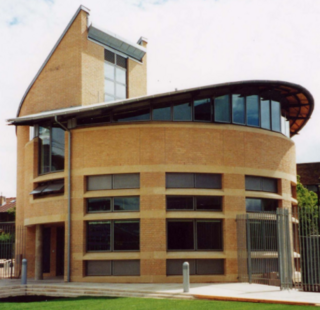 W
WThe Newton Gateway to Mathematics is a knowledge exchange centre at the University of Cambridge in the UK. As a knowledge intermediary for the mathematical sciences, it is overseen by the Isaac Newton Institute and the Centre for Mathematical Sciences. The Newton Gateway to Mathematics is an intermediary for knowledge exchange for both professional and academic users of mathematics. Each year the Newton Gateway organises multiple events and workshops that feature expert speakers from various industries, governments and scientific organisations that discuss mathematical technical and models, presented by leaders from diverse backgrounds, such as the health care and finances.
 W
WNorman Arthur Routledge was a British mathematician and schoolteacher. He was a personal friend of fellow mathematician Alan Turing (1912–1954).
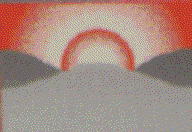 W
WTuring is a Pascal-like programming language developed in 1982 by Ric Holt and James Cordy, then of University of Toronto, in Toronto, Ontario, Canada. Turing is a descendant of Euclid, Pascal and SP/k that features a clean syntax and precise machine-independent semantics.
 W
WThe ACM A. M. Turing Award is an annual prize given by the Association for Computing Machinery (ACM) for contributions "of lasting and major technical importance to the computer field". It is generally recognized as the highest distinction in computer science and is known as or often referred to as "Nobel Prize of Computing".
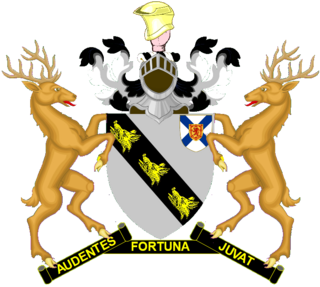 W
WThe Turing Baronetcy, of Foveran in the County of Aberdeen, is a title in the Baronetage of Nova Scotia. It was created in 1638 for John Turing, who was granted the barony of Foveran in Aberdeenshire by the king. He was a supporter of Charles I and was taken prisoner by the Covenanters in 1639. In 1651, he fought at the Battle of Worcester. The Turing family descends from Sir William Turing, a supporter of David II (1329–1371).
 W
WTuring College is the University of Kent's sixth college.
 W
WTuring House School is a co-educational comprehensive secondary school which was opened in 2015 in the London Borough of Richmond, south-west London, under the Government's free schools initiative. The proposal for the school was initiated by local parents in partnership with the Russell Education Trust (RET), who operate four other free schools in the south and south-west of England.
 W
WThe Turing Institute was an Artificial Intelligence laboratory based in Glasgow, Scotland between 1983 and 1994. The company undertook basic and applied research, working directly with large companies across Europe, the United States, and Japan developing software as well as providing training, consultancy and information services.
 W
WA Turing machine is a mathematical model of computation that defines an abstract machine that manipulates symbols on a strip of tape according to a table of rules. Despite the model's simplicity, given any computer algorithm, a Turing machine capable of simulating that algorithm's logic can be constructed.
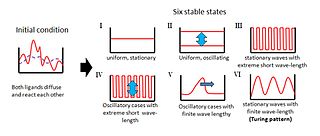 W
WThe Turing pattern is a concept introduced by English mathematician Alan Turing in a 1952 paper titled "The Chemical Basis of Morphogenesis" which describes how patterns in nature, such as stripes and spots, can arise naturally and autonomously from a homogeneous, uniform state. In his classic paper, Turing examined the behaviour of a system in which two diffusible substances interact with each other, and found that such a system is able to generate a spatially periodic pattern even from a random or almost uniform initial condition. Turing hypothesized that the resulting wavelike patterns are the chemical basis of morphogenesis.
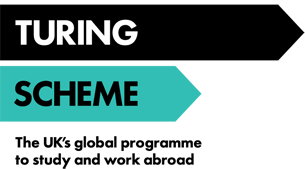 W
WThe Turing scheme is a student exchange programme established by the United Kingdom Department for Education in 2021 as a replacement for the European Union Erasmus Programme following Brexit.
 W
WThe Turing Talk, previously known as the Turing Lecture, is an annual award lecture delivered by a noted speaker on the subject of Computer Science. Sponsored and co-hosted by the Institution of Engineering and Technology (IET) and the British Computer Society, the talk has been delivered at different locations in the United Kingdom annually since 1999. Venues for the talk have included Savoy Place, the Royal Institution in London, Cardiff University, The University of Manchester, Belfast City Hall and the University of Glasgow. The main talk is preluded with an insight speaker, who performs an opening act to the main event.
 W
WThe Turing test, originally called the imitation game by Alan Turing in 1950, is a test of a machine's ability to exhibit intelligent behaviour equivalent to, or indistinguishable from, that of a human. Turing proposed that a human evaluator would judge natural language conversations between a human and a machine designed to generate human-like responses. The evaluator would be aware that one of the two partners in conversation is a machine, and all participants would be separated from one another. The conversation would be limited to a text-only channel such as a computer keyboard and screen so the result would not depend on the machine's ability to render words as speech. If the evaluator cannot reliably tell the machine from the human, the machine is said to have passed the test. The test results do not depend on the machine's ability to give correct answers to questions, only how closely its answers resemble those a human would give.
 W
WThe Turing Trust is a British charitable organisation that supports education in sub-Saharan Africa through the reuse of computers and improvement of associated teacher training.
 W
WSir John Dermot Turing, 12th Baronet is a British solicitor and author.
 W
WThe Turing Trust is a British charitable organisation that supports education in sub-Saharan Africa through the reuse of computers and improvement of associated teacher training.
 W
WTurochamp is a chess program developed by Alan Turing and David Champernowne in 1948. It was created as part of research by the pair into computer science and machine learning. Turochamp is capable of playing an entire chess game against a human player at a low level of play by calculating all potential moves and all potential player moves in response, as well as some further moves it deems considerable. It then assigns point values to each game state, and selects the move resulting in the highest point value.
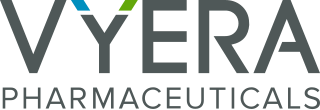 W
WVyera Pharmaceuticals is a pharmaceutical company incorporated in Zug, Switzerland, with offices in New York City. The company started to do business in the US as Vyera Pharmaceuticals in September 2017.